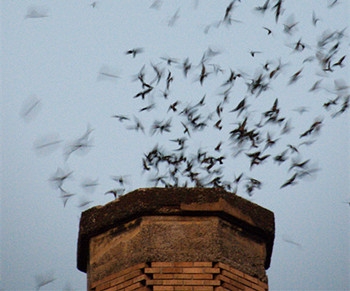
But there is at least one place in Florida where the manatees benefit from humans being around. Clean, hot water released from this power plant turns a man-made inlet into a hot tub. And during winter months when sea temperatures drop below 20 degrees centigrade, manatees gather here to keep warm. It’s actually an artificial version of the natural hot springs where manatees traditionally congregate. But this particular location seems to be extremely popular. During the coldest spells, more than 300 manatees can gather here.
但在佛羅里達(dá),至少還是有一個(gè)地方的人類活動(dòng)能給海牛帶來益處的。這里發(fā)電廠排出的清潔的熱水使這個(gè)人工的排水口變成了一個(gè)溫泉。在冬季的幾個(gè)月里,海水的溫度低于20攝氏度,海牛們則聚集在這里取暖。這其實(shí)是一種人工的天然溫泉,而海牛則一直喜歡在溫泉聚集。但是這里似乎極受歡迎。在最冷的一段時(shí)間里,300多只海牛都聚集在這里。
With so many of these shy creatures in one place, the power plant has become a tourist attraction. It may not be the most scenic setting, but this is a unique chance to see one of the largest gatherings of manatees in the world.
因?yàn)槟茉谝粋€(gè)地方看到這么多的害羞可愛的海牛,此處的發(fā)電廠已經(jīng)成為了一個(gè)景點(diǎn)。這里可能不是風(fēng)景最美麗的,但這確是能看到世界最大海牛聚集地的獨(dú)特的機(jī)會(huì)。
People have become dependent on industry to support their modern lifestyle, so too it seems has some of North America’s wildlife. Every September, the skies over Portland, Oregon become crowded with vaux's swifts. These birds have chosen a 30-meter chimney stack as a place to roost. Tens of thousands funnel down into the disused chimney where they huddle together for the night. Vaux's swifts traditionally roost communally in the hollow trees, but as many of North America’s forests are destroyed, they've turned to man-made structures.
人們?yōu)榱吮3脂F(xiàn)代化的生活方式已經(jīng)越來越依賴工業(yè),而北美的一些野生動(dòng)物也是如此。每逢九月,俄勒岡州波特蘭的上空都會(huì)布滿沃氏雨燕的身影。這些鳥兒選擇了一個(gè)30米高的煙囪筑巢。數(shù)萬只沃氏雨燕擠在著這個(gè)廢棄的煙囪中過夜。沃氏雨燕之前通常在中空的樹中筑巢,但是隨著很多北美森林的毀壞,它們便轉(zhuǎn)向了這些人造建筑。
英文文本來自普特英語,譯文屬可可原創(chuàng),僅供學(xué)習(xí)交流使用,未經(jīng)許可不得轉(zhuǎn)載。











